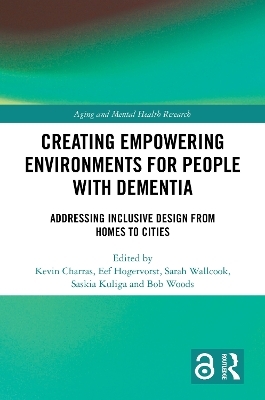
Creating Empowering Environments for People with Dementia
Routledge (Verlag)
978-1-032-54303-1 (ISBN)
Featuring the voices and opinions of people with dementia, the chapters showcase individual homes, special dementia facilities, different forms of care homes, and public spaces, from landscape to urbanism, as examples of how to meet the needs and preferences for those living with dementia now. As a response to a recent Cochrane meta-analysis (2022) which highlighted the problems associated with using traditional, medically orientated evaluative methods for environmental design, this book demonstrates a range of research methods that can be used to inform and investigate good co-design of dementia-enabling environments. Furthermore, the book addresses cultural differences in people’s needs and illustrates past, ongoing, and novel initiatives worldwide.
Ultimately, this timely volume focuses on person-centred design that enables empowerment, quality of life, health, and citizenship in people living with dementia. It will be of value to researchers, scholars, and postgraduate students studying gerontology, dementia specifically, and those involved with architecture and the built environment for societal benefit more broadly.
The Open Access version of this book, available at http://www.taylorfrancis.com, has been made available under a Creative Commons Attribution-Non Commercial-No Derivatives (CC-BY-NC-ND) 4.0 license.
Kevin Charras is Director at the Living Lab Aging and Vulnerabilities, Department of Geriatrics, University Hospital of Rennes, France. Eef Hogervorst is Professor of Biological Psychology and Director of Dementia Research, Loughborough University, UK. Sarah Wallcook is a Researcher, at the The Stockholm Gerontology Research Centre and affiliated to the Care Research Group, Department of Social Work at Stockholm University, Sweden. Saskia Kuliga is a Postdoctoral Researcher and PI at the German Centre for Neurodegenerative Diseases (DZNE), Germany, and affiliated with the Department of Nursing Science, Faculty of Health at the University of Witten/Herdecke in Witten, Germany. Bob Woods is Emeritus Professor of Clinical Psychology of Older People at Bangor University, UK, and former clinical psychologist specialising in dementia care.
Prologue Design for dementia: 50 years on
Part 1. Setting the scene: History and underlying design mainstreams and philosophies
Chapter 1. The implicit use of theoretical models should be made explicit in dementia inclusive design
Chapter 2. Creating Homes for Individuals living with Dementia: The Past, The Present and The Future
Chapter 3. Advances in research and practice on environmental design of care facilities for people living with dementia
Part 2 People with dementia are central to the design process
Chapter 4. The voice of people with dementia at the core of environmental design
Chapter 5. The use of virtual reality to support participatory design processes in environmental design for cognitive change
Chapter 6. Improving housing decisions for and with people with dementia: a co-design approach
Part 3 Dementia friendly neighbourhoods
Chapter 7. How can public organizations, transport systems and spaces be made more dementia friendly? Findings from Participatory Health Research and Architecture
Chapter 8. Rural and urban transportation and technology use: what needs to be considered?
Chapter 9. Toilets: a key feature for inclusive design. Newbuild and refurbishment
Chapter 10. Selected innovative research projects of early career researchers:
10.1. Project 1. Dementia-Enabling Neighbourhoods - Participatory development of dementia-enabling neighbourhoods in Bremen
10.2. Project 2. Inclusive co-research with people living with dementia about wayfinding in their living environment and neighbourhood
Part 4 General hospital design
Chapter 11. Dementia-Friendly Hospitals: Current State and Future Directions
Chapter 12. Architectural Design Guidance for General Hospitals: Ways to implement proven concepts and to accommodate future challenges
Part 5 Care home design
Chapter 13. Translating environmental design knowledge into practice: progress and challenges
Chapter 14. Sociotherapeutic Living environments in long-term care organisations
Chapter 15. Dementia-friendly design: toward minimizing spatial disorientation in residential care homes
Chapter 16. Green care farms and other innovative settings
Chapter 17. Selected innovative research projects II:
17.1. Project 1. The German Environmental Audit Tool in nursing homes
17.2. Project 2. Decision-making in Care Homes: The impact of the environment on people living with dementia sharing their everyday decisions
Epilogue
| Erscheinungsdatum | 24.07.2024 |
|---|---|
| Reihe/Serie | Aging and Mental Health Research |
| Zusatzinfo | 6 Tables, black and white; 3 Line drawings, color; 2 Line drawings, black and white; 14 Halftones, color; 17 Illustrations, color; 2 Illustrations, black and white |
| Verlagsort | London |
| Sprache | englisch |
| Maße | 156 x 234 mm |
| Gewicht | 640 g |
| Themenwelt | Medizin / Pharmazie ► Medizinische Fachgebiete ► Geriatrie |
| Naturwissenschaften ► Biologie ► Ökologie / Naturschutz | |
| Naturwissenschaften ► Geowissenschaften ► Geografie / Kartografie | |
| Technik ► Architektur | |
| Technik ► Umwelttechnik / Biotechnologie | |
| ISBN-10 | 1-032-54303-5 / 1032543035 |
| ISBN-13 | 978-1-032-54303-1 / 9781032543031 |
| Zustand | Neuware |
| Haben Sie eine Frage zum Produkt? |
aus dem Bereich


